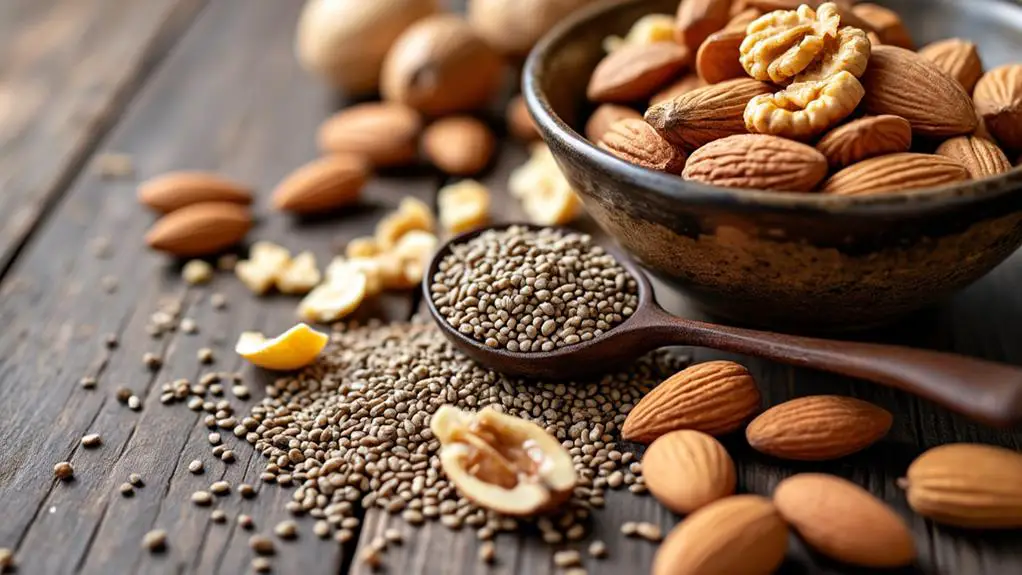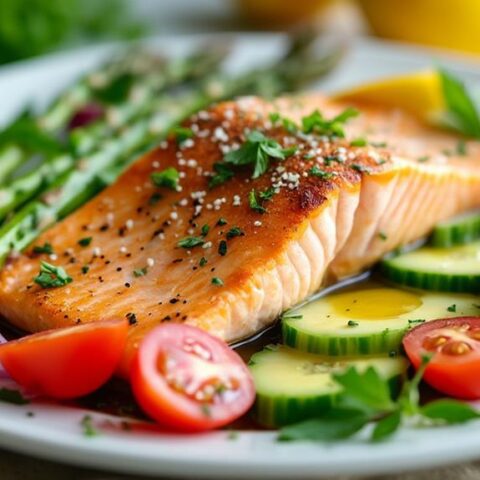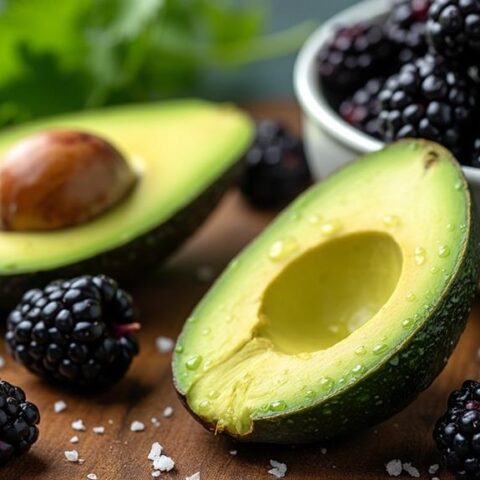The ketogenic diet includes nutrient-dense, low-carb foods crucial for maintaining ketosis. High-quality animal proteins like fresh meat, poultry, and fatty fish provide essential omega-3 fatty acids. Dairy options such as heavy cream and hard cheeses are low in carbs and rich in calcium. Low-carb vegetables like broccoli and spinach supply antioxidants and fiber. Avocados and olives offer heart-healthy monounsaturated fats. Nuts and seeds provide healthy fats while aiding in portion control. Healthy oils like olive and avocado oil are also recommended. Stay hydrated with water, unsweetened tea, and coffee. Explore further to optimize your keto diet effectively.
Key Takeaways
- Fresh meat, poultry, and fatty fish provide zero carbs and high-quality protein.
- High-fat dairy products like heavy cream and hard cheeses are low-carb.
- Low-carb vegetables such as broccoli, spinach, and cauliflower are nutrient-dense and fiber-rich.
- Nuts and seeds, like almonds and flaxseeds, offer healthy fats and low net carbs.
- Healthy fats from sources like olive oil, avocado oil, and butter are essential for the keto diet.
Animal Proteins
Animal proteins play a vital role in the ketogenic diet due to their high protein content and minimal carbohydrate levels, making them perfect for muscle preservation and overall satiety.
Protein sources such as fresh meat and poultry contain zero carbohydrates, offering excellent high-quality protein that is essential for muscle retention. This is particularly significant in a low-carb dietary regimen where maintaining muscle mass is a priority.
Additionally, fatty fish like salmon are exemplary choices; they are not only nearly carb-free but also rich in omega-3 fatty acids. These fatty acids are known to enhance insulin sensitivity and support cardiovascular health, adding another layer of benefit to their high protein content.
Shrimp and most crabs contain zero carbs, making seafood an ideal option for keto dieters.
Eggs, another versatile and nutrient-rich protein source, contain less than 1 gram of carbs and around 6 grams of protein per large egg. Furthermore, they provide essential nutrients and antioxidants that are beneficial for eye health.
Grass-fed meats are a superior choice for those seeking additional health benefits, as they offer higher levels of omega-3 fatty acids and conjugated linoleic acid (CLA).
These components have been shown to positively influence cholesterol levels and support fat loss, making them invaluable in a well-rounded ketogenic diet.
Dairy and Cream
Incorporating dairy and cream into a ketogenic diet can greatly enhance its nutritional profile and palatability. High-fat dairy products such as heavy cream, cream cheese, and hard cheeses are staples due to their low carbohydrate content. For example, cheddar cheese contains approximately 1 gram of carbs per ounce and is rich in calcium, making it both a nutritious and keto-friendly option.
For those seeking additional variety, soft cheeses like Brie and mascarpone can also be excellent choices due to their low carb content. Full-fat dairy options are particularly valuable on the ketogenic diet because they promote satiety and provide healthy fats that aid in maintaining ketosis.
Cream varieties like heavy cream and half-and-half are extremely low in carbs, making them suitable for coffee or various recipes. These products also contain beneficial compounds such as conjugated linoleic acid (CLA), which may support fat loss.
For those who prefer dairy alternatives, options such as unsweetened almond milk or coconut milk can be used to maintain low carbohydrate intake. Although plain Greek yogurt and cottage cheese offer high protein content, their carb content, which ranges from 6-8 grams per serving, necessitates moderation.
Low-Carb Vegetables
Low-carb vegetables such as broccoli, spinach, and cauliflower are nutrient-dense options that provide essential vitamins and minerals while maintaining a low carbohydrate content, making them ideal for ketogenic diets.
These vegetables, like arugula and asparagus, are also rich in antioxidants and fiber, supporting digestion and overall health.
Their versatility in cooking, from creating cauliflower rice to using zucchini as a pasta substitute, allows for diverse and satisfying meal choices.
To optimize health benefits, it is recommended to include a variety of these vegetables in your daily intake, ensuring adequate fiber and micronutrient consumption.
Nutrient Density and Benefits
When considering the foundation of a well-balanced ketogenic diet, the nutrient density and benefits of low-carb vegetables cannot be overstated. Vegetables such as spinach, kale, and broccoli are excellent choices because they are low in calories and carbohydrates yet rich in essential vitamins and minerals. These nutrient-dense options play a vital role in maintaining overall health while adhering to a ketogenic regimen.
Non-starchy vegetables provide significant fiber benefits, aiding in digestion and promoting gut health. This dietary fiber is important for maintaining low net carb counts, which is necessary for staying in ketosis. Additionally, these vegetables serve as potent antioxidant sources, protecting against oxidative stress and supporting overall well-being.
Here is a summary of key low-carb vegetables and their nutritional profiles:
| Vegetable | Net Carbs (per cup) | Key Nutrients |
|---|---|---|
| Spinach | 1g | Vitamin A, Iron |
| Kale | 3g | Vitamin K, Calcium |
| Broccoli | 4g | Vitamin C, Fiber |
| Cauliflower | 2g | Vitamin C, Folate |
Incorporating these vegetables guarantees a diverse intake of nutrients without exceeding carb limits, thereby supporting the dietary goals of individuals on a ketogenic diet. This approach allows for a variety of flavors and textures, important for sustaining long-term dietary adherence.
Versatile Cooking Options
Frequently, the versatility of low-carb vegetables makes them indispensable in a ketogenic diet. Cauliflower, broccoli, and zucchini are exemplary substitutes for higher-carb staples like rice and pasta, facilitating meal prep while guaranteeing that meals remain keto-friendly and nutrient-rich. These vegetables contain a host of essential nutrients without the excessive carbohydrates, making them ideal for maintaining ketosis.
Leafy greens such as spinach and kale are particularly beneficial; they offer high levels of vitamins A, C, and K, with less than 1g of net carbs per cup. These can be effortlessly incorporated into salads and smoothies, enriching the diet with crucial nutrients.
Non-starchy vegetables like bell peppers and green beans also contribute to a balanced keto diet by providing fiber and antioxidants, which enhance the nutritional profile of any dish.
Effective cooking techniques, such as roasting or sautéing low-carb vegetables in healthy fats like olive oil or coconut oil, can greatly improve both flavor and texture. Incorporating a variety of these vegetables into meal prep guarantees a well-rounded intake of essential vitamins and minerals, all while adhering to the carbohydrate limits necessary for ketosis.
This strategy supports both the nutritional and metabolic goals of a ketogenic lifestyle.
Recommended Daily Intake
Building on the versatility of low-carb vegetables in ketogenic meal preparation, one should take into account their recommended daily intake to maximize nutritional benefits while maintaining ketosis. Consuming nutrient-dense vegetables such as spinach, kale, and broccoli not only guarantees adequate vitamin and mineral intake but also helps keep calorie consumption low.
To stay within the desired carbohydrate threshold, aim for a net carb intake of less than 8 grams per cup of these vegetables, achieved by subtracting fiber from total carbohydrates.
Incorporating low-carb vegetables into meal planning is essential for satiety and maintaining ketosis. Non-starchy options like cauliflower and zucchini can effectively replace higher-carb foods such as rice and pasta, thereby supporting your dietary goals.
For peak health benefits, it's important to diversify your vegetable intake.
Key points for recommended daily intake include:
- Aim for a variety of low-carb vegetables to guarantee a broad spectrum of nutrients.
- Keep serving sizes within the net carb limit of 8 grams per cup.
- Use non-starchy vegetables as substitutes for higher-carb foods.
- Monitor total carbohydrate intake to stay within ketosis.
- Include leafy greens and cruciferous vegetables regularly in your meal planning.
High-Fat Vegetables
High-fat vegetables, such as avocados and olives, are integral to a ketogenic diet due to their nutrient density and healthy fat content.
These vegetables provide monounsaturated fats that support heart health, while their low net carb content helps maintain ketosis.
Additionally, they enhance satiety and offer essential nutrients like potassium and vitamin E, contributing to overall well-being.
Including them in your meals not only supports weight management but also provides a variety of vitamins and minerals essential for daily health.
Nutrient Density Benefits
A key advantage of incorporating certain vegetables into a ketogenic diet is their impressive nutrient density, particularly those that are high in healthy fats. High-fat vegetables like avocados and olives not only support nutrient absorption but also contribute greatly to health optimization. These vegetables are low in net carbs, making them ideal for maintaining ketosis while providing essential nutrients.
Avocados, for instance, contain approximately 17 grams of total carbs and 14 grams of fiber per whole fruit, ensuring low net carb intake. Furthermore, avocados are rich in potassium, a mineral essential for maintaining electrolyte balance during ketosis.
Similarly, olives offer substantial health benefits, thanks to their high oleuropein content, a compound with anti-inflammatory properties.
Incorporating these high-fat vegetables into a ketogenic diet offers multiple benefits:
- Enhanced nutrient absorption: The healthy fats in these vegetables improve the absorption of fat-soluble vitamins.
- Heart health support: Both avocados and olives contribute to improved cholesterol levels.
- Electrolyte balance: High potassium content helps maintain electrolyte balance.
- Increased satiety: These vegetables promote a feeling of fullness, aiding in weight management.
- Anti-inflammatory properties: Oleuropein in olives helps reduce inflammation.
Thus, including avocados and olives in meals can greatly enhance nutrient density and support overall health on a ketogenic diet.
Healthy Fat Sources
The rich nutrient density of certain vegetables aligns perfectly with the objectives of a ketogenic diet, particularly when considering the role of healthy fat sources. High-fat vegetables such as avocados and olives are exemplary choices, offering both nutritional benefits and the healthy fats essential for ketosis.
Avocado varieties are especially notable for their high content of monounsaturated fats, potassium, and fiber. These nutrients not only support heart health but also facilitate the shift into ketosis by stabilizing blood sugar levels and promoting satiety.
Olives, another high-fat vegetable, are rich in oleuropein, an anti-inflammatory compound that has been shown to help lower LDL cholesterol levels. This makes olives an excellent addition to a ketogenic diet, contributing to cardiovascular health.
Furthermore, both avocados and olives provide versatility in meal planning. They can be easily incorporated into salads, spreads, and dips, enhancing flavor and texture without adding significant carbohydrates.
When considering healthy fat sources, the regular consumption of avocados is highly recommended. Research indicates that daily intake of avocados can lead to improved cholesterol levels and reduced inflammation.
Utilizing olive oil extracted from olives can further enhance the diet's nutritional profile, making these vegetables indispensable components of a well-rounded ketogenic plan.
Heart Health Impact
Avocado- and olive-rich diets have demonstrated significant benefits for heart health, largely due to their high monounsaturated fat content.
These high-fat vegetables not only enhance the variety of a ketogenic diet but also contribute to cardiovascular well-being through several mechanisms.
Monounsaturated fats found in avocados and olives have been linked to improved heart health and reduced LDL cholesterol levels.
Specifically, avocado consumption has been associated with a 13% reduction in LDL cholesterol, a significant factor in cardiovascular health.
Olives also offer unique olive properties, such as oleuropein, a compound with anti-inflammatory effects that may protect against heart disease.
Key Heart Health Benefits of Avocados and Olives:
- Monounsaturated Fats: Essential for lowering LDL cholesterol and improving heart health.
- Anti-Inflammatory Properties: Oleuropein in olives helps reduce inflammation, a risk factor for heart disease.
- Potassium Content: Both avocados and olives provide potassium, necessary for blood pressure regulation.
- Dietary Variety: Enhances the enjoyment and adherence to a ketogenic diet.
- Heart-Healthy Fats: Important for maintaining overall cardiovascular well-being.
Incorporating high-fat vegetables like avocados and olives into a ketogenic diet not only boosts nutrient diversity but also provides substantial heart health benefits.
Nuts and Seeds

For individuals following a ketogenic diet, nuts and seeds serve as an excellent source of healthy fats and low carbohydrates. Nut varieties such as almonds and walnuts provide essential nutrients and maintain a low net carbohydrate count. A typical serving of almonds, for instance, offers approximately 6 grams of carbs, 4 grams of fiber, and 14 grams of fat, making it a nutrient-dense choice that supports the diet's macronutrient goals.
Considering protein needs on the keto diet, nuts and seeds also contribute a modest amount of protein, aiding in muscle maintenance and repair.
Seed benefits are equally significant, with options like chia seeds and flaxseeds standing out for their nutritional profiles. Flaxseeds, in particular, are highly beneficial on a keto diet, delivering 3 grams of carbs and 3 grams of fiber per tablespoon, effectively contributing zero net carbs.
These seeds are not only rich in healthy fats but also high in fiber, which aids digestive health and promotes satiety, helping to control appetite.
It is essential, however, to practice portion control when consuming nuts and seeds, as their high fat content can lead to an unintended increase in calorie intake.
Keto-Friendly Beverages
Choosing the right keto-friendly beverages is vital for maintaining ketosis and supporting overall health. To help you stay hydrated and within your macronutrient limits, consider these evidence-based options that align with keto dietary guidelines. Proper hydration tips and keto beverage recipes can greatly enhance your diet. For example, unsweetened almond milk is a great low-carb alternative to regular milk, providing only 1-2 grams of carbs per cup.
- Water: The ultimate keto-friendly beverage, water contains zero calories and carbs, making it indispensable for hydration and overall health.
- Unsweetened Coffee and Tea: Both beverages are carb-free and provide health benefits. Coffee may lower the risk of cardiovascular diseases, enhancing overall wellness.
- Sparkling Water: A revitalizing alternative to sugary sodas, sparkling water offers variety without carbs or calories. Make sure it is unsweetened to stay keto-compliant.
- Bone Broth: This low-carb, nutrient-rich beverage supplies electrolytes, collagen, and essential nutrients. It supports hydration and promotes gut health, making it a valuable addition to your keto regimen.
- Herbal Teas: Options like chamomile and peppermint are naturally carb-free and calorie-free. They add flavor and may offer various health benefits, contributing to your overall well-being.
These beverages not only help maintain ketosis but also provide essential nutrients, making them ideal choices for those following a keto diet. Incorporate these keto beverage recipes and hydration tips to optimize your health.
Frequently Asked Questions
What Foods Can I Eat on a Keto Diet?
In keto meal planning, you can consume meats, fatty seafood, low-carb vegetables, high-fat dairy, and healthy fats. For keto snack options, consider nuts, avocados, and full-fat cheeses, ensuring nutrient density and supporting ketosis efficiently.
What Food Is Not Allowed in Keto?
On a keto diet, foods high in carbohydrate intake, such as grains, starchy vegetables, high-sugar fruits, processed foods, and legumes, are not allowed. Effective meal planning and keto-friendly recipes focus on protein sources, healthy fats, and sugar alternatives.
What Are the 9 Rules of Keto?
The nine rules of keto include strict carb limitation, prioritizing high-fat intake, moderate protein consumption, staying hydrated, incorporating keto meal planning, choosing nutrient-dense foods, monitoring electrolytes, exploring keto snack ideas, and maintaining consistency.
What Fruit Can You Eat on Keto?
On a keto diet, you can enjoy low carb fruits such as berries, which offer the benefits of being high in fiber and low in net carbs. Avocados and unsweetened coconut also provide healthy fats with minimal carbohydrates.
Conclusion
The ketogenic diet emphasizes high-fat, low-carbohydrate foods, encompassing a variety of nutrient-dense options. Animal proteins, dairy, and cream serve as primary sources of essential amino acids and fats. Low-carb and high-fat vegetables contribute necessary vitamins and minerals while maintaining ketosis. Nuts and seeds provide additional healthy fats and fiber. Keto-friendly beverages facilitate hydration without disrupting carbohydrate restrictions. This dietary approach supports metabolic health and weight management through carefully selected, nutrient-rich food choices.










No Comments